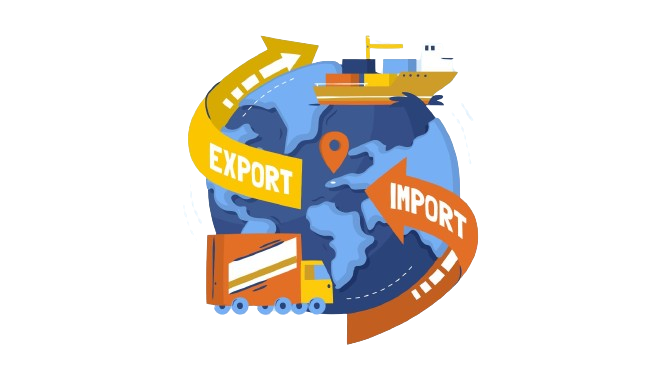



We get your business up and moving. We are a passionate bunch of number crunchers /budget heads. Whether it be an entire overhaul of your accounting department, managing your payrolling, or simply serving you as a bookkeeper – we are here.

You’ve always had an entrepreneurial spark and wanted to start your own business. But the traditional routes of retail, services or tech seem overdone. How about an import-export business?
Trading goods across borders can be extremely rewarding. The potential to explore new cultures, build global connections and of course, make good money, is huge.
Why start an import-export business in India? There are so many reasons to take the plunge!
This guide will walk you through how to start an import-export business in India, from developing a business plan to finding profitable products and trustworthy partners abroad.
Ready to begin your adventure in international trade? Let’s go!
Consider goods that are in high demand, low supply, and will generate strong profit margins. Some exciting options include:
Once you’ve identified some products to import or export, analyze the competition, licensing requirements, and potential customers. Then start contacting manufacturers, wholesalers, retailers and build your supply chain!
To start importing or exporting goods in India, you need to obtain an Importer-Exporter Code (IEC) from the Directorate General of Foreign Trade (DGFT). This is your business identification number for all your import and export activities.
Apply for your IEC on the DGFT website. You’ll need to provide some basic details about your business like the name, address, directors, and the type of import/export activities you’ll be conducting. The process is fairly straightforward and you can expect to receive your IEC within a week.
Once approved, your IEC code will allow you to:
Your IEC is an essential document to kickstart your business, so apply for it as soon as you have your business registered and are ready to start trading.
Now that you have your import-export license and business set up, it’s time to arrange how you will physically transport your goods internationally! This step is crucial because without efficient logistics, your business won’t get off the ground.
A freight forwarder will handle the shipping and logistics of transporting your cargo. Ask around for recommendations and check online reviews. Meet with a few to compare services and fees. Look for a forwarder that has experience shipping to your target countries.
Will you ship by air, sea or land? Air freight is fastest but most expensive. Sea freight is cheapest but slowest. Land freight works for overland routes. Choose the option that balances cost, speed and your product type.
Work with your forwarder to prepare documents like the bill of lading, certificate of origin, invoice, and packing list. These are required for customs clearance and must accompany your shipment.
Make sure your goods are packaged securely to withstand the rigors of international transport. Follow any special packaging requirements for your product type. Label each package clearly with details like sender, recipient, contents and quantity.
Stay on top of where your shipment is with tracking provided by your forwarder. Be available in case any issues come up with customs. Once delivered, follow up with your customer to ensure everything arrived in good order!
Mastering import-export documentation in India is crucial to running a successful business. The good news is, it’s not as complicated as it seems! The key is staying on top of the required paperwork.
Learn the specific documentation needed for your product. The main forms are the Bill of Lading (B/L), Commercial Invoice, Packing List, and Letter of Credit.
Triple check that all details on the forms are accurate, including product details, quantities, and prices. Any errors can lead to penalties, fines or shipment delays. It’s worth the extra time to ensure everything is precise.
Establish a good rapport with customs officials and freight forwarders. These valuable connections can help expedite the documentation process and clear up any questions. Offer to provide additional details or paperwork to keep things moving swiftly.
India’s import and export regulations are frequently changing. Subscribe to updates from trusted industry sources to stay on top of the latest rules. Remain compliant with all guidelines to avoid issues.
Maintain thorough records of all import-export documentation, correspondence, and transactions in case of an audit. Well-organized records demonstrate your professionalism and make the process faster and easier over time.
The government of India offers several schemes to promote exports from the country. As a new exporter, you can benefit immensely from these schemes.
SEIS offer duty rewards for exporting goods and services respectively. SEIS provides service exporters with a 5% incentive on net foreign exchange earnings.
The RoDTEP scheme has replaced the old MEIS w.e.f 01 January 2021. The RoDTEP scheme aims to refund all hidden taxes that were previously not refunded under any export incentive scheme, such as central and state taxes on fuel used for export product transportation, duties levied on electricity used for manufacturing, mandi tax levied by APMCs, toll tax and stamp duty on import-export documentation, and others.
Export Oriented Units (EOUs) and Special Economic Zones (SEZs) offer infrastructure and tax benefits for exporters. As an EOU, you can import raw materials duty-free and enjoy tax holidays for a certain period. SEZs also provide world-class infrastructure, tax benefits and simplified procedures. Units in SEZs mainly export their products and services.
By leveraging these schemes, you can gain a competitive edge in international markets. The incentives and support provided help reduce costs and improve operational efficiency. Make use of them fully to establish yourself as an exporter and scale your import-export business.
So there you have it – if you want to start an import-export business in India, now is the time.
The opportunity is ripe, the government is supportive, and global trade volumes are increasing. All you need to do is find the right product, locate dependable suppliers and customers, handle the paperwork efficiently, and maintain high quality standards.
What are you waiting for? Take that first step today to turn your dream of an international trading business into a reality. The world is open for business – now go out there and get started!
Crucially, as you embark on this venture, it’s imperative to recognize the financial intricacies that underpin your business’s sustainability.
Partnering with GJM & Co., can provide you with invaluable expertise in business formation, financial planning, and budgeting. As you weave together the fabric of your business, having a trusted advisor by your side can make all the difference in navigating the complexities of taxation, accounting, and financial strategy.
Should you have any queries or need consultation, Schedule a Call today or write to us at info@gjmco.com